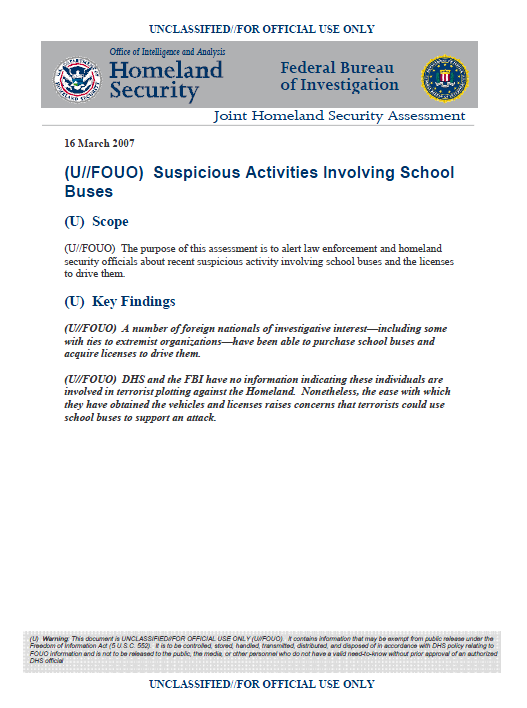DHS-FBI Joint Homeland Security Assessment
- 4 pages
- For Official Use Only
- March 16, 2007
(U) Scope
(U//FOUO) The purpose of this assessment is to alert law enforcement and homeland security officials about recent suspicious activity involving school buses and the licenses to drive them.
(U) Key Findings
(U//FOUO) A number of foreign nationals of investigative interest—including some with ties to extremist organizations—have been able to purchase school buses and acquire licenses to drive them.
(U//FOUO) DHS and the FBI have no information indicating these individuals are involved in terrorist plotting against the Homeland. Nonetheless, the ease with which they have obtained the vehicles and licenses raises concerns that terrorists could use school buses to support an attack.
(U) Suspicious Activities Involving School Buses
(U//FOUO) Most attempts by foreign nationals in the United States to acquire school buses and the licenses to drive them are legitimate. Individuals from the Middle East and South and Central America often purchase school buses to fulfill their transportation needs. For example, many foreign nationals use school buses to transport workers between job sites. Moreover, because driving is an easily transferable skill between countries, it would not be uncommon for a truck or bus driver from a foreign country to seek the same profession in the United States.
(U//FOUO) DHS and the FBI lack specific, credible intelligence indicating terrorists have been involved in procuring school buses or licenses to drive them, but several incidents raise concerns.
— (U//FOUO) Some school districts have reported an unusual increase in the number of foreign nationals seeking school bus driver positions. Subsequent FBI investigations have revealed that a number of applicants had connections to or sympathized with known terrorist groups.
— (U//FOUO) Most troublesome were individuals who the FBI reported had expressed interest in terrorist applications of explosives.(U) Potential Use of School Buses as Weapons
(U//FOUO) Intelligence reporting and historical attacks in the United States and overseas indicate terrorists prefer to use large vehicles containing explosives to conduct vehicle-borne improvised explosive device (VBIED) attacks.
— (U//FOUO) Both the 1993 bombing of the World Trade Center in New York and the 1995 bombing of the Alfred P. Murrah Federal Building in Oklahoma City used trucks containing large quantities of explosives.
— (U//FOUO) Overseas terrorist bombings using large, explosives-laden vehicles include Khobar Towers in Saudi Arabia in 1996; U.S. Embassies in Kenya and Tanzania in 1998; and commercial, religious, and government buildings in Turkey in 2003, among others.(U//FOUO) DHS and the FBI lack specific, credible intelligence indicating terrorists plan to use school buses as VBIEDs, but these vehicles have the capacity to carry large amounts of explosive material.
— (U//FOUO) Security surrounding school buses is generally relaxed. School bus parking lots often are unlocked and are not consistently monitored; some lots are unfenced and keys are often left in the buses so they can be moved quickly.
(U) Weaknesses in Commercial Driver’s Licensing Systems
(U//FOUO) School bus drivers are required to have a commercial driver’s license (CDL), but CDL requirements vary among states. DHS has previously published an assessment on how terrorists could exploit the CDL licensing system. Background checks for school bus drivers also vary from state to state; most require at least a state or FBI criminal check. Washington State, however, issues CDLs without proof of residency or legal status.
(U//FOUO) Once applicants obtain a CDL to drive large vehicles such as buses or trucks, they become eligible to apply for a hazardous material endorsement (HME) to legally transport hazardous materials. Instances continue to surface of individuals fraudulently obtaining valid CDL and HME credentials.
— (U//FOUO) Federal standards allow states to hire third parties—mainly private companies—to administer CDL tests. The majority of CDL fraud schemes involve corrupt third-party testers.
— (U//FOUO) In February 2007 a federal judge ordered the deportation of an Indian national whose suspicious behavior at a driving school instigated a nationwide antiterrorism investigation. The foreign national admitted to supplying falsified documents in his quest to obtain CDL/HME licenses.(U) Indicators of Suspicious Activities
(U//FOUO) Law enforcement should be aware of the following indicators of possible terrorist interest in school buses, CDLs, and HMEs:
— (U//FOUO) Background checks on applicants for school bus driver positions that suggest criminal or terrorist connections that require further investigation.
— (U//FOUO) Possession of a CDL to drive a school bus without the appropriate driving skills.
— (U//FOUO) Unusual interest in obtaining an HME when it is not required for the type of job such as driving a school bus.
— (U//FOUO) Reports of school bus surveillance in bus lots or while in transit.
— (U//FOUO) Reports by school district officials or bus vendors of suspicious attempts to purchase school buses.(U) Outlook
(U//FOUO) Suspicious incidents involving school bus purchases and abuse of commercial driver’s licensing processes raise concerns that terrorists could use school buses and hazardous materials in an attack. Law enforcement and homeland security officials need to be vigilant and investigate license applicants and holders with suspicious backgrounds or poor driving skills.

